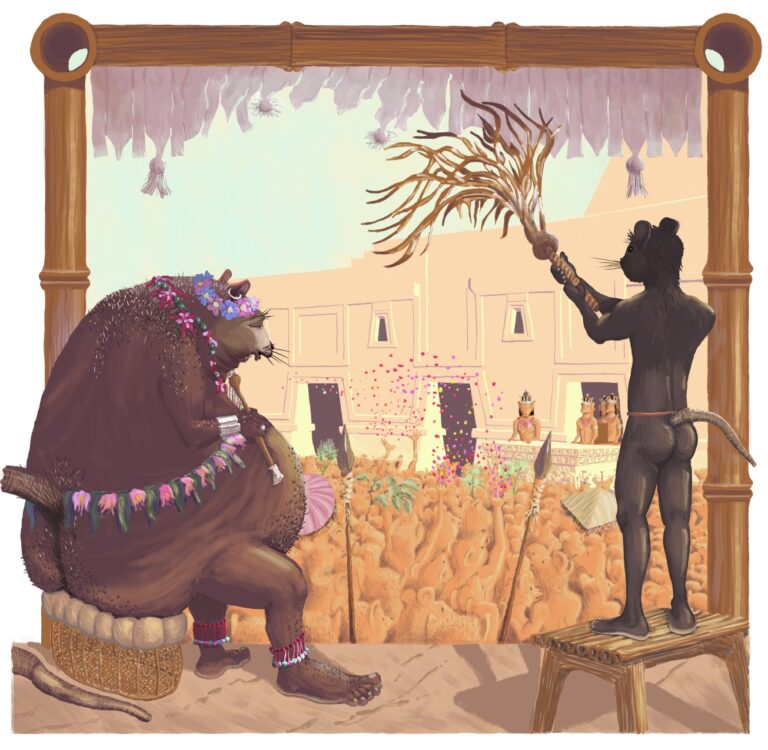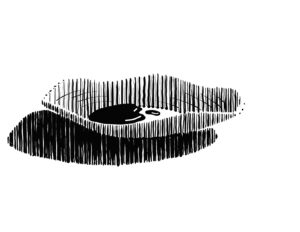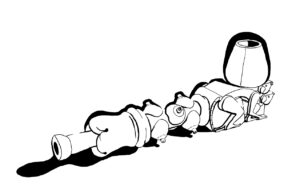
Thank you.
Your message has been sent and will receive a response.
Meanwhile, you can access
HunGar Book Galley
By clicking HERE.

The nation of Ratona pleadeth succour of
the Rat God. The King diverteth his
mind from unease for his Son.

There never was a rat
That there wasn’t a cat
That wanted it dead.
Nor time when rat
Was fond of cat.
Like a round table
Where starts a fable
Without any head ?
. . . Before Katrina’s excellent view from her upper room was adulterated by that templed pyramid of the rats, when rats lived in dread of cats, in a season when a persistent arid wind off the mountains had delayed the rains, and the Barrier River had dwindled to a stream that even cats might ford with boldness. Every rat that could be spared was conscripted to patrol the bank. Rat wives fretted for the welfare of their husbands. They forbad their children to wander afar and at night tucked them into their own beds for fear of marauding cats’ bearing off their little ones. The marsh waters had sunk, robbing the capital of its natural defence. Temporary barricades were hastily put in place. Fosses were excavated. Vines were woven into nets and laid concealed in the parched marsh grass. Branches were gnawed into spears to construct palisades. Stores of victuals were also carried into the city against lengthy siege. The rats laboured without rest and with pressing speed, as they had not in many a year.
In the Plaza of the Fathers, in the heart of Ratona, the population had gathered to beseech the Rat God to sail home from his furlough across the sea on that marine wind that would bring the longed-for rain. In the crowds were some with baskets of petals with which they bejewelled the air with colourful sprays, whilst others sang hymns of praise to flatter and entice their God. To one side of the plaza under the shade of a thatched awning, upon his seat of lacquered and enamelled cedar, on a dais fenced with knights of the noble houses of his realm, sate the enormous Rat King, Othon XVIII, therefrom to preside over the ceremony.
Across the plaza facing the King stretched the long, stuccoed and many-doored Home Temple. Before it upon a platform bedecked with flowers grown in the temple gardens were assembled the priests, round that great altar whereon they had pinned a tiny robin by its wings, whom they had made pliant and sleepy with liquor of the barbel leaf. The incision was made, the little heart fluttered as the tiny life leaked out, the spirt of blood was caught in a dish of fired clay. They did divide the heart in pieces that they ate betwixt them. Then with the plaudits of Ratona the tiny corpse was ignited. With incense the priests did sow the little flame, making it to burst into red and yellow blooms that exhausted themselves in drifts of smoke. Thereafter with great pomp was the bowl borne to the King. The folk parted, made obeisance before the train, casting petals on the path.
The King received the cup. He wore a chain of flowers round his neck and festive flowers was he crowned withal. He squinted at the scanty sip of blood, frowned, and tutted. With despondent gesture he bade an ewer of water brought to augment the mite. Then he did take the mug in his two hands and took sip of the still-warm beverage. Thereafter with heavy tread he came down from his dais, depending on the arms of his attendants.

Bordering a side of the plaza was a building of austere mien with but one large opening in its wall, guarded by a thicket of iron bars. This was not the prison, but the seraglio of His Highness’s Harem. Many were the bosoms beating for love, like caged birds for air, pressed against the bars; lovely and liquid and long-lashed and longing were the eyes gazing out, more fascinated by the virile blades that numbered amongst the knights than by the spectacle of the ceremony. But where, the ladies asked one another, was the Prince Hranu himself, the King’s dashing firstborn, most eligible bachelor in all Ratland? Nahum was not there either, with eyes like the black pools where sweethearts might take a moonlit bath before conjugating upon the bank; nor hearty Astre with the elegant whiskers long as grass that he curled. The twain were ever at the young heir’s side. Grave and battle-seasoned Etiam was absent too; and Esan was not to be seen to-day in the plaza, sweet and beautiful as mortal boy scarce could be.
Othon XVIII bore the cup of blood to the temple. There was he divested of his flowers and fineries before he entered the chill gloom of the sacred vault, alone. With profound reverence he set the sacrifice at the feet of the stone Rat, muttering charms of invocation and supplication in the ancient, sacred rat tongue.
Blinking, temporarily blinded as he emerged into the bright sun, Othon XVIII dismissed the priests, seated himself in his palanquin and made his ceremonial exit.
In the palace forthwith he asked for tidings of his son. No word yet, he was told, from the river, of Hranu. The Prince and his hunting party had gone questing for more substantial fare to serve upon the city’s altar. Now they were many days absent. Briefly the King occupied himself with the business of the city’s defence, but found he had not heart for it to-day, vexed as he was by his son’s recalcitrance, recklessness and, perchance some ill hap befalling the Prince, uneasy too. Surrendering after little effort, he instructed his war council to continue without him, and betook himself to his bath, there to smoke sweet herbs and to have his cares massaged away by Mayte, a comely rat maid he much liked of present, and who, despite her recent arrival at court, was already expecting a litter of His Highness’s bastards.


Your message has been sent and will receive a response.
Meanwhile, you can access
By clicking HERE.